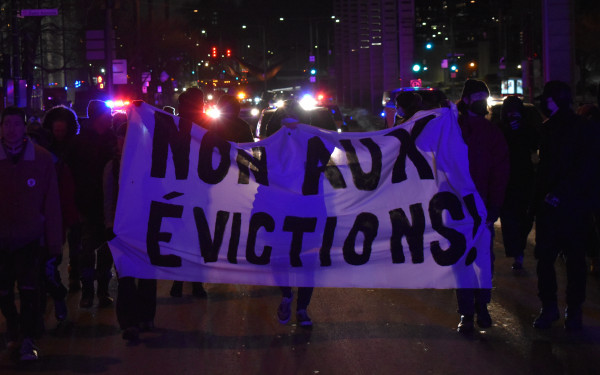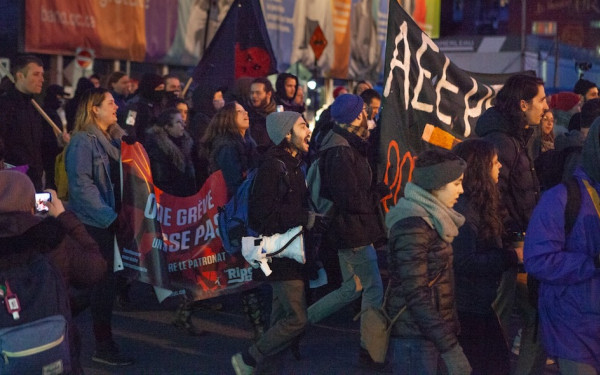City of Montreal announces expansion of EMMIS squad amidst criticism
EMMIS threatens the trust between social workers and the unhoused population
Projet Montréal, the municipal political party led by Montreal Mayor Valérie Plante, announced the expansion of the Équipe mobile de médiation et d’intervention sociale (EMMIS) initiative last month, covering all 19 Montreal boroughs.
This decision came amidst criticism from urban experts and the unhoused community, who believe the initiative threatens trust between street workers and the unhoused.
Expansion of EMMIS
EMMIS is operated by the Société de développement social, an organization that promotes the involvement of the private companies in responding to the houselessness crisis. In 2021, the City of Montreal introduced the EMMIS project as a solution to cohabitation issues arising due to the housing crisis.
“There's [been] more violence, [EMMIS] is really a way to prevent things from escalating,” Notre-Dame-de-Grâce City Councillor Despina Sourias said.
Citizens, businesses and residents can call on EMMIS to de-escalate and provide support with cohabitation issues that may arise between unhoused and housed individuals. The EMMIS team has social workers and police working in tandem in response to these calls. According to Sourias, EMMIS aims to deploy approximately 90 intervention workers across the city by 2025 to work in partnerships with existing local organizations.
With the expansion, teams would be able to offer services such as car rides to shelters and referrals to community resources, as well as provide support tailored to the unique realities of each borough.
The expansion is set to cost $50 million, with funds coming in from both the city and the Ministry of Public Security, which Sourias said supports the SPVM investing in local initiatives.
Criticism of the squad
Ted Rutland, an urban politics and policing expert, said that the EMMIS team destroyed the bond community members had with social workers.
In 2023, he published a report alongside the Réseau d’aide aux personnes seules et itinérantes de Montréal (RAPSIM), in which 38 street outreach workers who work with unhoused people were interviewed about EMMIS. The report found that EMMIS impaired the workers’ ability to gain the trust of the unhoused population and form long-term relationships.
Rutland said that the starting point of EMMIS’s intervention comes from a complaint regarding an unhoused person, with the resolution often being removing that person with or against their will.
“They’re not working for unhoused people,” Rutland said.
According to the city’s website, EMMIS does not offer any follow-up interventions to unhoused individuals.
Rutland said that EMMIS workers do not seek to build relationships with the unhoused to help them in their goals—neither the short term nor long term—but instead seek to respond to complaints from residents or businesses. He argued that Projet Montréal’s investment in projects such as EMMIS help create a sanitized view of downtown Montreal.
“It's fundamentally a middle-class and largely white vision of what it means to live in a city,” Rutland said. “They want the police to ensure that anyone who wants to enjoy a pedestrianized view, or a cute cafe, or move into a neighbourhood and renovate a complex or tower downtown, never have to feel uncomfortable.”
Investing in long-term solutions
John Wright has been unhoused for the last two years, ever since he said he lost his wallet and keys. Today, he sleeps in a makeshift shelter outside of the Open Door, a drop-in service centre for low-income and unhoused people in downtown Montreal. Wright said that the centre does not always have room for him.
Wright believes that only social workers should be working with unhoused folks.
“I'm not scared of the cops, but [for] someone that's a crackhead or on panic [and is] scared, it's wrong. The social worker that's on-site should make the call for the cops if they need help,” Wright said. ”If not, you're doing [it] wrong. These people are on drugs, they don't want the cops, they're scared shitless of the cops. I think calling the cops is just wrong, get them out of our life.”
Wright said there are two social workers who support him regularly, but he still believes that the city should be investing in long-term solutions if they want to support the unhoused population at large.
“Build more [and] more homes, more social housing, it's not enough man, it's not enough,” Wright said.
For the city, dealing with the root causes of houselessness is not only a municipal problem.
Sourias said that, as the provincial government controls housing and health services, the municipal government is limited in what it can do in this domain. She added that all levels of government need to invest and care about houselessness.
“To work on all these issues, the city does not have all the means to do it. We don't have all the competencies either,” Sourias said. “[The provincial government] has the funds and the competencies to act globally on it. What we work on is what we call cohabitation.”
Sourias emphasized that investing in EMMIS is essential because it prevents escalation, but Rutland argued that EMMIS does not truly prevent escalation since they do not answer 911 calls directly but instead are referred to by police.
“We haven't solved the problem of the police ending up in these situations where they're not trained to respond, where there's a high risk of violence,” Rutland said.
Rutland argues that the decision to expand EMMIS instead of offering funding to community organizations is a reflection of the city's ultimate goal of simply removing the unhoused off the street; an extension on the “Not In My Backyard” mentality. He said that EMMIS ultimately can remove somebody from a public space, even if they do not want to move.
“You can make a source of discomfort disappear if a person disappears for a while,” Rutland said, “but if you don't address the fundamental needs, the problem doesn't go away.”
This article originally appeared in Volume 45, Issue 4, published October 22, 2024.







